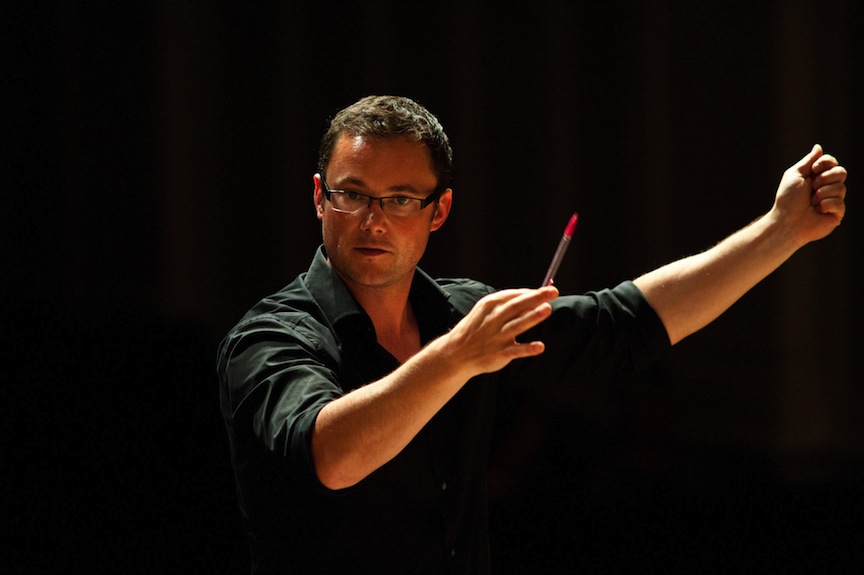
You shouldn’t touch Beethoven’s Symphony No. 9 until your late 40s or early 50s. That advice is stuck in Matthew Halls’s memory — even though the 30-something British conductor has chosen to ignore it for his Toronto Symphony Orchestra début this week.
- Classical Music 101: What Does A Conductor Do? - June 17, 2019
- Classical Music 101 | What Does Period Instrument Mean? - May 6, 2019
- CLASSICAL MUSIC 101 | What Does It Mean To Be In Tune? - April 23, 2019
“I wonder if it’s any more straightforward preparing this piece for the first time in your early 50s?” asks Halls, rhetorically. “It’s a monumental work and it demands a lot of absorption, a lot of thought and a lot of study and lots of time.”
He adds, “It’s a daunting challenge for any conductor at any stage in their career, because it is such an iconic, a cosmic work.”
Halls also admits that the first of three Toronto concerts at Roy Thomson Hall on Wednesday night will be his first professional association with this masterwork. “Hopefully this is where my journey with the piece begins, not ends,” he laughs.
We probably don’t need to worry. Halls has steadily been building a respected career in Britain and Europe, gaining many admirers along the way.
Like Toronto Symphony conductor laureate Sir Andrew Davis, Halls has a background in choral direction, playing the organ and conducting opera. His church-musician father had the boy singing from an early age and, when his voice broke, encouraged Matthew to take charge of the choir.
In his adult life, Halls has amassed a rich background in historically informed performance of Bach and Handel with Europe’s finest baroque ensembles (including William Christie’s Les Arts florissants) and as head of King’s Consort, which he renamed the Retrospect Ensemble four years ago.
In a move that signals his broadening repertoire as well as increasingly busy international schedule, Halls left the Retrospect Ensemble at the end of last year.
My first contact with Halls was listening to him perform J.S. Bach’s Goldberg Variations on harpsichord — a magically lyrical, surprisingly relaxed interpretation that showed off the diverse interpretive possibilities of an instrument with a fraction of the dynamic range of a modern piano.
In conversation, Halls rejects the ascetic approach to Bach and Handel and Mozart and Haydn of the period-performance purists of the 1970s and ’80s, saying that, too often, the music was stripped of those elements that grabbed the attention of listeners.
Not that he has his own recipe; “I remain perplexed and confused about how these things work and how much of it is up to personal interpretation,” says Halls. He prefers to think in terms of “an ideal in the moment.”
Unlike the music of Bach and Haydn, which is now pretty much the preserve of period orchestras, Beethoven is, “at the heart and soul of the modern symphonic tradition,” says Halls. “The Ninth stands as this great bridge between the classical world and all that was to follow. For that reason alone, and because of the universality of Beethoven’s musical language, that’s what keeps the players absolutely in tune with his style.”
The conductor allows that the insights from period-performance practice can help bring fresh life to a modern orchestra’s interpretation. Halls cites the work of conductor Riccardo Chailly recent recording of the full set of Beethoven symphonies with the Leipzig Gewandhaus Orchestra. He calls the result “electrifying,” as Chailly blends his own acute musical instincts with the insights of historical scholarship.
“I find that very inspiring, drawing from both traditions,” says Halls.
It will be interesting to see what emerges from the Toronto Symphony, the Toronto Mendelssohn Choir and four excellent soloists — soprano Erin Wall, mezzo Allyson McHardy, tenor Joseph Kaiser and bass-baritone Shenyang — on Wednesday, Friday and Saturday. You’ll find the concert details here.
+++
In case you feel like listening to Halls’s ideal of a great performance of Beethoven’s Ninth, here’s Chailly in action with the Gewandhaus Orchestra and Chorus in what truly is an electrifying performance (even with the video and audio not in sync):
John Terauds
- Classical Music 101: What Does A Conductor Do? - June 17, 2019
- Classical Music 101 | What Does Period Instrument Mean? - May 6, 2019
- CLASSICAL MUSIC 101 | What Does It Mean To Be In Tune? - April 23, 2019



